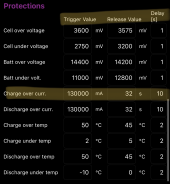I’ve got a 300A Heltec BMS that I’m happy with but it has a ‘Maximum Charge Current of 100A’
It’s a common-port BMS and so my first question is to understand how the max charge current and max discharge current can be different in a common-port BMS?
And assuming there is a good reason for the difference, my second question is to understand what happens when charge current exceeds the maximum (and how seriously to design under that limit)?
I’m only charging at 45A maximum today but planning to increase the size of the PV array.
Can a 300A BMS with a 100A max charge current typically exceed that charge level for 1-2 hours by a small % without causing damage?
On the discharge side, the BMS has a Current Limit Protection of 1200A and will shut down the BMS is currents ever reach that level.
And it also has a Maximum Continuous Overcurrent of 300A (which I assume means it will shut down if discharging above 300A for long enough).
So is a Maximum Charge Current the same thing? Will it shut down the BMS if charging above 100A for long enough (but prevent damage)?
I’m trying to understand whether I can plan for Peak Charge currents (1-2 hours) that may occassional my exceed 100A by 5-10% without major concern or I need to find a different BMS before increasing PV power that much…
It’s a common-port BMS and so my first question is to understand how the max charge current and max discharge current can be different in a common-port BMS?
And assuming there is a good reason for the difference, my second question is to understand what happens when charge current exceeds the maximum (and how seriously to design under that limit)?
I’m only charging at 45A maximum today but planning to increase the size of the PV array.
Can a 300A BMS with a 100A max charge current typically exceed that charge level for 1-2 hours by a small % without causing damage?
On the discharge side, the BMS has a Current Limit Protection of 1200A and will shut down the BMS is currents ever reach that level.
And it also has a Maximum Continuous Overcurrent of 300A (which I assume means it will shut down if discharging above 300A for long enough).
So is a Maximum Charge Current the same thing? Will it shut down the BMS if charging above 100A for long enough (but prevent damage)?
I’m trying to understand whether I can plan for Peak Charge currents (1-2 hours) that may occassional my exceed 100A by 5-10% without major concern or I need to find a different BMS before increasing PV power that much…



